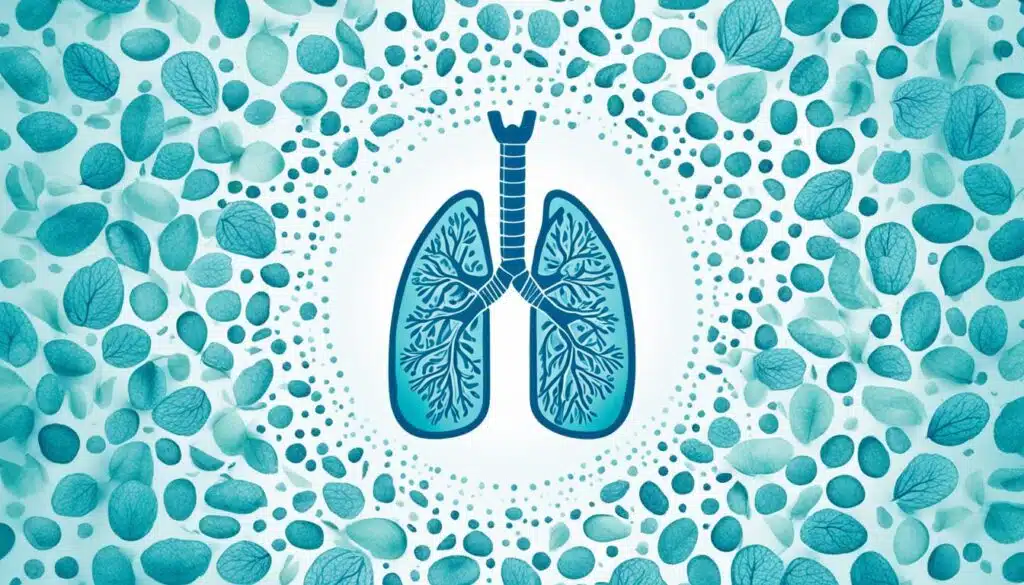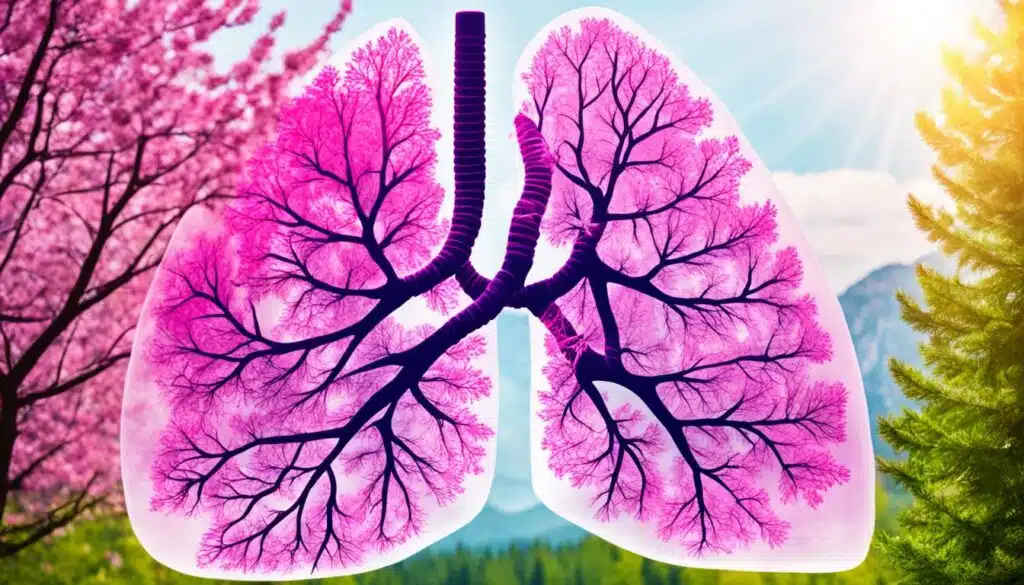Your lungs are key in breathing. They clean out waste and send oxygen to your blood and cells. As you get older, your lung capacity drops, making it harder to breathe. Yet, you can do things to keep your lungs healthy. Even boost how much oxygen your lungs can take in. This piece shares tips on how to do just that through lifestyle changes and medical help.
Key Takeaways
- The lungs play a vital role in delivering oxygen to the body’s cells.
- Lung capacity naturally declines with age, making respiratory function more challenging.
- Proactive steps can be taken to maintain and even improve overall lung health.
- Lifestyle changes and medical interventions can positively impact lung function and capacity.
- This article will provide comprehensive guidance on improving lung health.
Stop Smoking and Avoid Secondhand Smoke
Cigarette smoking is a top cause of lung cancer and diseases like COPD. It makes it harder to breathe by narrowing the airways. This leads to lung swelling and inflammation. If you quit, your lungs start healing in just a day.
Quit Smoking for Faster Lung Improvement
Stopping smoking hugely boosts your lung health and lowers the risk of diseases like lung cancer and COPD. As soon as you quit, your body works to fix the damage from smoke, showing quick benefits.
Secondhand Smoke: A Silent Threat to Lung Health
Being around secondhand smoke can lead to breathing issues and diseases. It can happen even if you’re not the one smoking. This type of smoke makes your airways narrow, making it harder to breathe. It also increases the chance of lung conditions, such as chronic bronchitis and emphysema.
Exercise Regularly

Staying active is crucial for healthy lungs. Exercise makes your heart and lungs push harder. They deliver more oxygen to muscles. This makes your heart and lungs stronger. With time, being active helps you not get out of breath easily. Your body learns to use oxygen better.
Strengthen Your Heart and Lungs with Physical Activity
Doing exercise and staying active has big health benefits. Your heart and lungs get better at sending blood and oxygen to your muscles. This improves your heart health, lung capacity, and how well your lungs work.
Choosing different exercises helps a lot. You can try walking fast, jogging, or swimming. These activities make your heart and lungs healthier. Strength training can also make you breathe easier during hard work.
It’s important to find activities you like and can do regularly. It could be walking every day, doing yoga weekly, or lifting weights every other week. Making exercise a habit greatly helps your lungs be healthier and perform better.
Maintain a Healthy Diet and Stay Hydrated

Your body uses food to turn into energy. This process, called metabolism, needs your lungs to be healthy. To keep your lung function and respiratory health strong, eat a nutrient-rich diet. Each food type plays a role in keeping your lungs working well, so eat a variety.
Nourish Your Lungs with Nutrient-Rich Foods
Foods like leafy greens, citrus fruits, and nuts are great for your lungs. They are full of vitamins, minerals, and antioxidants. Adding these foods to your diet can boost how well your lungs work and lower the chance of lung problems.
Importance of Staying Hydrated for Lung Health
Keeping hydrated is very important for your lung health. Water helps keep the airways and lungs clear. When you’re not drinking enough, mucus gets thick. This can slow breathing and raise the risk of getting sick or having lung problems.
Get Regular Check-ups and Vaccinations

Having regular check-ups with your healthcare provider is key. It keeps lung diseases and conditions at bay. These check-ups are vital, even when you feel well. Not seeing the doctor could let lung issues grow big. So, talking about any breathing problems you notice is a must.
Early Detection of Lung Conditions Through Screening
Various tests like lung function and chest images help find lung health problems early. Doing these tests helps spot issues before they get worse. This means better management and quality of life.
Vaccines: Protecting Your Lungs from Respiratory Illnesses
Infectious respiratory diseases like influenza and pneumococcal pneumonia quickly move between people. To guard your lungs, keep up with vaccines. This is especially crucial if you already have a lung disease.
Avoid Air Pollution Exposure

Both indoor and outdoor air pollution can harm your lungs. If you have a disease like COPD, these risks are higher. You can improve your indoor air by dusting, changing filters, and keeping your home smoke-free.
Indoor Air Quality and Its Impact on Lung Health
Substances like household chemicals, mold, and radon can worsen lung problems. Secondhand smoke, with over 7,000 chemicals, can cause respiratory issues and diseases. Lowering indoor pollution is key to lung health.
Outdoor Air Pollution: Strategies to Minimize Exposure
Outdoor air sometimes has more pollutants than inside. Ozone and particles are common dangers. It’s important to check the air quality. Avoid outdoor activities on unhealthy air days to protect your lungs. Reducing air pollution at its source is crucial. This involves addressing climate change and natural disasters. By being aware of air quality and taking steps to reduce exposure, you help keep your lungs healthy.
Practice Breathing Exercises
Adding breathing exercises to your day can make your lung function better. It also helps your lung capacity grow. Methods like diaphragmatic breathing and deep breathing exercises boost the strength and endurance of your lungs. They can also lower stress and better your respiratory health.
A simple exercise involves sitting or lying comfortably. Then, shut your eyes and focus on deep, slow breaths. Watch your belly rise as you breathe in. And, let it fall as you breathe out. Do this for a few minutes, feeling the air move in and out. This diaphragmatic breathing helps your lung capacity and improves your breathing.
Another great exercise is deep breathing. Breathe in slowly through your nose. Hold it for a few seconds, then breathe out through your mouth. Do this a few times. It helps grow your chest and belly as you breathe in, easing as you breathe out. This deep breathing can lower stress, better your lung function, and boost your respiratory health.
Bringing a mix of breathing exercises to your daily life can really help. It positively affects your lung function, lung capacity, and respiratory health. Just keep at it and be patient. The effects of these practices will show in time.
Lung Health

Knowing about the anatomy and function of the lungs helps us keep our lung health and respiratory health in check. The lungs are vital for our respiratory system, cleaning out waste and putting oxygen into our blood. Over time, our lungs naturally lose lung capacity. It’s crucial to look after our pulmonary health early on, using lifestyle changes and medical help.
The lungs do a lot to make sure our bodies get the oxygen we need. Knowing about the lung anatomy, such as the airways, alveoli, and diaphragm, lets us keep lung function up and avoid lung disorders and lung conditions. Being aware of the lung’s job in the respiratory system helps us protect our pulmonary health all through our lives.
Maintain Good Hygiene Practices
Keeping clean with regular handwashing is important. So is staying away from others when you should. This can cut the chance of getting or giving respiratory infections. Always wash your hands for 20 seconds with soap and water. When you can’t wash, use hand sanitizer. This stops the spread of respiratory illnesses. Also, keeping space from people and wearing masks in crowded places can keep your lung health safe.
Handwashing and Social Distancing: Reducing Infection Risks
Learning to wash your hands right and staying apart from others can greatly prevent respiratory infections. You should wash your hands often. Use alcohol hand sanitizer if water isn’t there for at least 20 seconds. By doing this, you get rid of dangerous germs. This lowers the chance of passing respiratory illnesses to others. Also, staying a good distance from people, especially in crowded or stuffy rooms, can safeguard your lung health.
Get Screened for Lung Cancer
If you’re at a high risk of lung cancer, like past smokers, getting screened is key. Regular screenings with low-dose CT scans can spot cancer early. This cuts down lung cancer deaths by catching it when it’s most treatable. Make sure to talk to your healthcare provider to see if you should get screened. It’s a big part of taking care of your lung health.
Low-Dose CT Scans for Early Detection
Finding lung cancer early is very important. Low-dose CT scans are great for this because they’re safe and catch cancer sooner. It’s less radiation than regular CT scans, but just as effective. Early detection means better treatment options and a higher chance of beating the disease. For those at high risk, it’s an important step to stay healthy.
Join Support Groups and Rehabilitation Programs
If you live with asthma, COPD, or lung cancer, joining a support group is key. The American Lung Association’s Better Breathers Clubs offer great help. In these clubs, you can learn ways to breathe better and manage your condition. It’s also a chance to meet people who understand and offer support.
If you’re dealing with chronic lung illnesses, reaching out is important. Consider joining a pulmonary rehabilitation program. These programs last 10 to 18 weeks and are designed just for you. They include exercises, education, and emotional support to boost your lung health and quality of life.
Also Read : Managing Stress For Better Cardiovascular Health
Conclusion
Keeping your lungs in top shape is key for good health. The lungs help to carry oxygen around your body. To do this, you should stop smoking, stay active, eat well, have regular health checks, and learn breathing exercises. These steps will boost your lung power and lower chances of breathing issues. Just small changes can do a lot for your lungs over time.
Caring for your respiratory system and lung capacity is vital. Making these changes will help you stay healthier and avoid lung problems. Focus on your pulmonary health for an all-around better life.
Your lungs are at the core of your breathing. Taking good care of them is a must. This way, your body gets all the oxygen it needs. A little care and work can mean years of better health for your lungs.





